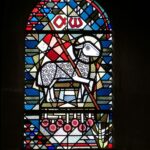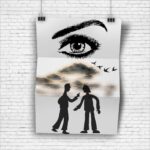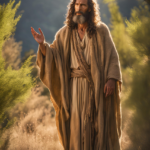Genesis 18 – 19
Romans 5:1 – 11
Matthew 9:35 – 10:8, 9 – 23
What really matters according to the Bible? Last week, in New Orleans, the Southern Baptists met to once again insist that what really matters in life is to keep women out of the pulpit.
And there are Christians who want us to believe that the big issue that should concern our every waking moment is what happened to Sodom. The salvation of the world not Sodom is our focus. God’s purposes of peace, praise, and reconciliation are based on love, not the sexual identity of the men of Sodom.
Julian of Norwich was once asked if she wanted to know what the purpose of God is. She answered, “Love was his meaning.”
God’s indestructible energy is poured into making a universe of reconciliation and love. This is what lies at the foundation of everything, so please excuse me if I refuse to get all fired up over what happened to Sodom. The world exists because of the love and generosity of God. And no one is left out of this love. So don’t try to tell me that gays need to be “cured” of gayness, have some kind of therapy to make them straight before they can receive the grace of God. The grace of God precedes everything and everyone. You call this gospel.
Now, evangelicals are all in a tizzy about Sodom and about gays, but God is not, to use a crude anthropomorphism, biting her fingernails over Sodom.
Here’s a bit of context: We are not only celebrating Pride Sunday; we are asserting our positive witness against the growing backlash against gays in the political and religious arenas. More than 500 anti-gay bills have been filed this year in state legislatures. This is why we must repeat the lessons.
There is one lesson that you may have missed about evangelicals. Even when they are defeated, they keep coming back. When the Supreme Court declared gay marriage legal, evangelicals intensified their efforts to demonize gays. They never give up. They have a list. They are checking it twice. They are determined to change everything about our culture that they despise. This is why they are trying to undo gains by the LGBTQ community. This is why they are passing silly laws like “Don’t say gay.” They are never happy, satisfied, or content. There’s nothing more dangerous to human rights and dignity than angry, fearful Christians. When a certain kind of righteous indignation grips your mind and heart, you are always upset, insulted, agitated, determined. These Christians have a permanent case of righteous indigestion and neither Tums nor Pepcid will help them.
If evangelicals keep insisting, however, that progressive Christians are wrong to accept gays, they need to be prepared for a strong counter response. Last week, there were two responses on our Facebook page that I wish to address. One guy asked, “When can I come to Straight Man Representation Day? Please let me know?” The other guy said, “Emmanuel Friedens Church this is a church marching in a gay pride parade? I’m confused.”
So, buckle your seat belts, put on a crash helmet, and prepare for lessons long overdue. Genesis 18 and 19 represent the weaponization of Scripture against the gay community. Evangelicals have abused the story of Sodom forever.
A bit of biblical context to help us: The story of Sarah and Sodom appear in the same chapter. They belong together somehow. Let’s take a in depth look.
In Genesis 18, three angels visited Abraham to tell him the good news that he was having a son. Two of these angels also visited Sodom. This links the birth of Isaac and the destruction of Sodom. It’s one story about God’s purpose for humanity. The big stories, the metanarratives the scholars say, are in our readings: The promise of Isaac, the story of justification, and Jesus sending out his witnesses are the strands of the gospel story. Sodom is a bit part in the narrative.
As the promise of Isaac contains all the promises of God, the destruction of Sodom reveals the consequences of bad choices. In Genesis 18:19, God explains the deal with Sodom: “I have chosen Abraham, that he may charge his children and his household after him to keep the way of the Lord by doing righteousness and justice; so that the Lord may bring about for Abraham what he has promised him.” Sodom is the example of a people not doing righteousness and justice. There is good and there is evil – Abraham and Sodom are just one of the many examples of this basic truth in Scripture. There is good and there is evil.
Walter Wink, in his helpful little book, Homosexuality and Christian Faith says, three things are especially important here. First, Sodom is a wanton city; and God doesn’t want God’s people living in such a way. This is not about homosexual sin; it is about universal disobedience by an entire city.
The math should make this clear. In any given culture about 8 – 10% of the people are gay. That means that 90% of the sinning is being done by heterosexuals, but they are blaming it all on gays. Any Bible-memorizing kid still remembers Romans 3:23 — “For all have sinned and fallen short of the glory of God.” Evangelicals, if they convince everyone that homosexuals are the cause of the decline of our culture, can hide their own sins. They won’t have to be held accountable for all the heterosexual abuse of women, all the whoring, adultery, fornication, greed, stealing, and lying they do.
We do not serve and love an angry, vengeful, get-even, capricious God. Never confuse God Almighty, Father, Mother, Son, and Holy Spirit with those mean-spirited Greek and Roman gods. The Bible doesn’t teach us that God is a bad-tempered God who gets his way through coercion, destruction, and violence. So, the Genesis writer tells us a story about Abraham appealing to what is the most true thing about God – God’s mercy. Abraham argues with God and God agrees that if 10 righteous people can be found, Sodom will be spared. The failure to find 10 righteous people isn’t God’s fault and Sodom faces the consequences of its own unrighteousness.
Second, the context does make clear that the men of Sodom have sexual intentions, but the intention is not so much homosexual activity as it is rape. Heterosexual males were intent on humiliating strangers by treating them “like women,” thus demasculinizing them. Their brutal behavior has nothing to do with the question of whether genuine love expressed between consenting adults of the same sex is legitimate or not. And rape – whether homosexual or heterosexual – is not about sex. It is about power.
The story of Sodom does not contain any sexual activity. Men are boasting about intended sexual consequences. It amounts to bathroom talk. Locker room talk. “Grab women by the genitals” Trump talk.
Men are always trying to prove they really are men. Bragging, blustering, bluffing, showing up, exaggerating – these are the traits of toxic masculinity. There’s no sacred ritual declaring us as men. So many men never know if they are men or boys.
Third, no other book in the Bible backs up the evangelical insistence that Sodom is about homosexuality. Ezekiel says the sin of Sodom was pride, lack of hospitality, and not caring for the poor. Amos gives the same reason: the poor are oppressed and the needy are crushed (4:1). Isaiah: “Your hands are full of blood” (1:15); “the spoil of the poor is in your houses” and for “grinding the face of the poor” (3:14, 15). Indeed, “the daughters of Zion are haughty” and are “glancing wantonly with their eyes” (3:16). Also in Zephaniah: have filled houses “with violence and fraud” (1:9). The only New Testament reference to Sodom and Gomorrah comes from Jesus, who predicts a similar judgment in his own day (Matt. 10:14-15). Jesus says that those towns that don’t provide hospitality for his witnesses shall receive the judgment of Sodom. Read the rest of the story and you will not make Sodom a story about gays.
Humankind has enough sin without concocting the strange idea that being gay is sinful. I struggle enough with the idea of original sin because there’s nothing original about our sinfulness. I certainly am not buying the idea that a person is a sinner on the basis of sexuality.
I add one more lesson: the issue here is hospitality. Sodom is an inhospitable city. The question we need to ask is, “What constitutes a holy people? The answer: hospitality. Holiness is hospitality toward God, living in such a way that God may feel at home in our midst (Ellen Davis, The Art of Reading Scripture).
Hospitality is not the word that comes to mind in the church’s treatment of women, minorities, immigrants, and LGBTQ. “There is too much historical evidence that Christians, on the basis of how they read their Bibles, have authorized and carried out appalling abuse, even murder of women, Jews, slaves, colonized people, homosexuals. Bad Bible reading has claimed too many victims over the centuries. Too many Bibles are soaked in the blood, not only of Jesus, but the blood of those killed, hung, exterminated, and destroyed in the name of a God of wrath.
Sodom is the best trope I have found to describe what happens to cities who defy God’s purposes. Matthew 25 is the real conclusion to Sodom. This is the judgment of God on all cities: Sodom failed to provide adequately for the poor. They did not feed the hungry, provide water for the thirsty, did not welcome strangers, did not clothe the naked, did not provide for the homeless, did not visit the prisoners.
Here we stand firmly committed to the love of Almighty God, the power of the gospel for whosoever will, for all who come just as they are, for the mercy, grace, persuasion, and care of God. Here we stand – a welcoming and affirming Church. And if that angers those who criticize us from a distance, we will deal with that.
I loved the story of the bronze serpent as a kid. A personal disclaimer at the beginning: I do not read this story as a literal account of the people being killed by poisonous, fiery, flying snakes on the command of God. But there are snakes in the grass – poisonous snakes in the grass.
There are always snakes in the wilderness. The wilderness was a dangerous place. Isaiah describes it as a land of trouble and distress, of lioness and roaring lion, of viper and flying serpent (Isaiah 30:6). Not a place for amateurs. The wilderness would have been a challenge for the Tracker, CBS’ new television drama.
The first time I read the story, I overlooked the cause of the plague of flying snakes. “The people spoke against God and against Moses, ‘Why have you brought us up out of Egypt to die in the wilderness? For there is no food and no water, and we detest this miserable food.’” If the people are still complaining about manna, food provided by God, then the complaint is directed at the Head Chef, God, the provider of manna.
It would be a bit like complaining about the bread and wine at the Sacrament: “my holy cracker was stale” or “the wine had no flavor.”
There’s always a wilderness and there’s always something to cause us to be afraid. I, for example, am afraid that fear has become the dominant emotion of millions of us. Our brothers and sisters are afraid America is being lost, afraid God is being dishonored, afraid the Christian way of life is disappearing, afraid. People have become afraid of one another. People with whom we disagree are labeled as enemies.
God teaches Israel how to walk, not in fear, but in faith, through the wilderness. The people are commanded to look in the eyes of their greatest fear. Look at the snake!
There are always snakes in the wilderness, snakes in the camp! We live in a snake-filled world. There are 3,971 species of snakes in our world and 600 of them are poisonous. Black mambas, coral snakes, puff adders, carpet vipers, rattlesnakes, cotton-mouth water moccasins, and cobras. Watching an episode of NCIS Syndey, I learned he most poisonous snake in Australia is the Coastal Eastern Taipan.
From personal experience, I can testify a cotton-mouth moccasin is not only poisonous, but aggressive and mean. While most snakes will slither away, the moccasin will chase you through the swamp.
With Indiana Jones I’m asking, “Why does it always have to be snakes?” You may not have noticed we have more snakes in the Bible than in Harry Potter! There’s the talking snake in the garden. The talking snake in Harry Potter is named Nagini. A person able to speak to snakes is known as a Parselmouth.
There’s the rod of Moses that God turned into a hissing snake and told Moses to pick it up. There’s the bronze snake in the wilderness.
In the spurious ending to Mark’s Gospel there are alleged words from Jesus telling his followers they can pick up snakes and not be harmed. These verses gave rise to the snake-handling tradition of the Applachachian mountains in our own country. Will Campbell tells the story of 3 Army buddies attending a service in a country church, and when the preacher brought out the rattlesnakes, one of them said, “I’m outta here out the back door.” “This church doesn’t have a back door.” “Well, where do you think they want it?”
So, what happened? Instead of getting rid of the snakes, God told Moses to make a replica of a poisonous serpent, set it on a pole, and if anyone bitten by a serpent looked upon the snake they would live. What an odd way of saving a people – a bronze snake on a stick. God expects us to participate in our salvation. “By grace we are saved, but we are to participate through faith.
Never mistake God for an amateur psychologist no matter how many pop psychology, group therapy sermons you may hear about positive thinking and your best life now.
“Look at the snake on a stick and live.” It sounds crazy, doesn’t it? Our survival depends upon learning how to trust God’s mercy enough to look up instead of down. Why are so many of you looking down, down on yourself, down on the present, down on the future? Looking up is the way of God’s people. Have you ever realized that America will not be made great by people looking down, putting down others, seething in anger, mistrust, and revenge. It’s a recipe for destruction.
Moses tears around the camp, shouting “Look at the bronze snake and live!” Tell everyone! Look! Look! The snake on the pole stands for death – all the death in the world – but God turns it into life. I hear Jesus saying, “Just as Moses lifted up the serpent in the wilderness, so must the Son of Man be lifted up, and whoever believes in him may have eternal life.” Later, Jesus says, “I will be lifted up from the earth and draw all people to me.” We must look on this man’s death if we are to have life. God turns death into life. That’s good enough for me.
Philosopher Ludwig Wittgenstein says, “To repeat: don’t think, but look!”
“Could there be,” Wittgenstein queried, “human beings lacking in the capacity to see something as something—and what would that be like? What sort of consequences would it have? —Would this defect be comparable to color-blindness or to not having absolute pitch? —We will call it “aspect-blindness.”
How many of us can’t see the truth because we are blinded by a false perspective?
We have eyes but do not see. Stanley Hauerwas: “We must be trained to see something since we cannot simply see by looking” (Hauerwas, Stanley. Working with Words: On Learning to Speak Christian, 289. Cascade Books, an imprint of Wipf and Stock Publishers. Kindle Edition).
Are you aware that we are facing a plague of fiery, flying, poisonous snakes? Jesus called religious leaders a “bunch of snakes,” and there are always snakes in the clergy. And there are snakes in politics, poisonous snakes lies and bad behavior.
The story of Israel is the story of her training to become a people whose survival depends on learning to trust God in a snake-infested world. If your most basic instinct today is mistrust, you are lost in the wilderness. Christianity is a faith of trusting God’s goodness. If your second most basic instinct is fear, you are lost in the wilderness. Do not fear and trust.
Look to Jesus and his cross. “For the message about the cross is foolishness to those who are perishing, but to us who are being saved it is the power of God.” I fear for those Christian movements who have flags and no crosses, rallies but no revivals, and resentment and no reconciliation. If you claim to be a Christian and you are responsible for some of the ugliness, the bitterness, the meanness, the cruelty in our world, you need to look at Jesus and his cross. With the cross as our daily companion, we will identify with human suffering and refuse to participate in acts of indignity toward Others. The cross – it’s the Christian way.
God has made God’s mark on the world of death with a Son on a pair of sticks. Tilt the cross to the side and it becomes an X – it becomes God’s mark. And as the atheist Strang tells his son in the Broadway play Equus, “The cross can mark a man for life.” And so it is. We are to bear the mark of the cross, the sign of the cross, saying to all who meet us on the road that we belong to Jesus. We participate in his life, death, and resurrection. We are his people.
What has happened to so many Christians? Take off those red MAGA caps and go find the cross you discarded. Now, take up your cross daily and follow Jesus. Neither Trump nor Biden can save us.
Step away from the crazy, wacky theology suggesting that Christians should control all the mountains of cultural, political, and educational power. We are not called to rule but to serve this world. Now, take up your cross daily and follow Jesus.
Get down off your high horse of demanding the power to control the lives of all the American people. What’s this crazy stuff about destroying diversity, inclusion, and equity? There’s some xenophobia in the hearts of too many Americans? God has made of one blood all nations of the earth. Now, take up your cross and daily follow Jesus. Look to Jesus and be saved! Look to Jesus!
Paul puts it in terms of life and death: “You were dead . . . . But God who is rich in mercy . . . . made us alive together with Christ.” Then, as if he can’t wait for the punch line, Paul injects, “by grace you have been saved.”
Saved for what? Read the rest of the Epistle reading: “Created in Christ Jesus for good works.” Do we understand? Saved by grace people are created by God to provide radical care for others. Hospitality not hostility. Generosity not grinding spite. Kindness not meanness. Empathy not enmity.
Please listen to me. The people of the cross are not saved to advance political alienation, demagoguery, violence, and advancing authoritarianism.
We are not saved by grace to produce distrust, animosity, and chaos. We are not saved by grace to ravage democratic norms and values, undermine civic culture and the rule of law, and inhibit deliberation with childish behavior. There’
By participating in Jesus’ suffering and death, we are a people bronzed and lifted up by God so that the world may see there is an alternative to being captives of death. No longer frightened we can embrace the outcast and the enemy, be free to walk the wilderness without fear of snakes. Everything is possible to those who look to him who is the eternal dispenser of freedom and life.
We are invited to eat this bread and drink this wine which becomes for us Christ’s body and blood. In this meal we are consumed by what we consume, and therefore we participate in the mystery of God’s salvation of the world. We become the sacrament that the frightened world so desperately needs. How odd, how mysterious, but, oh my, how powerful!











